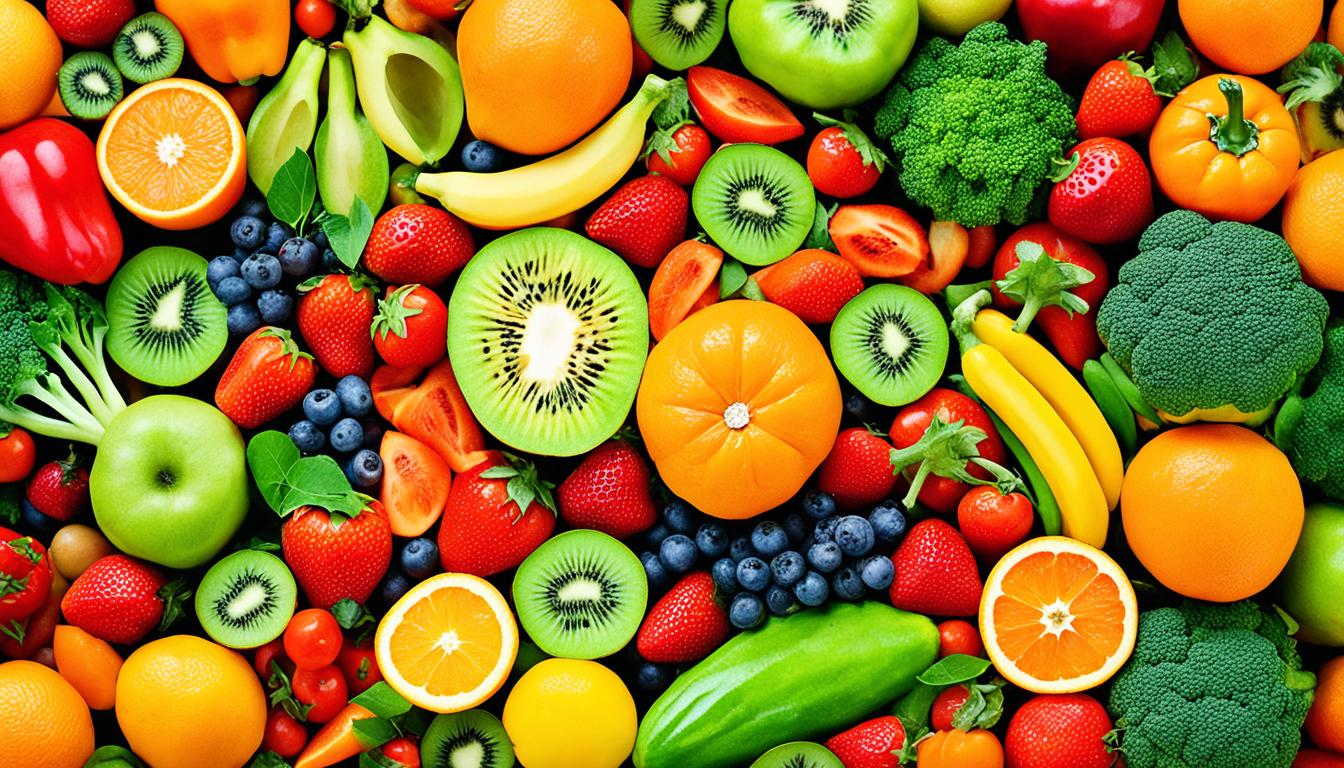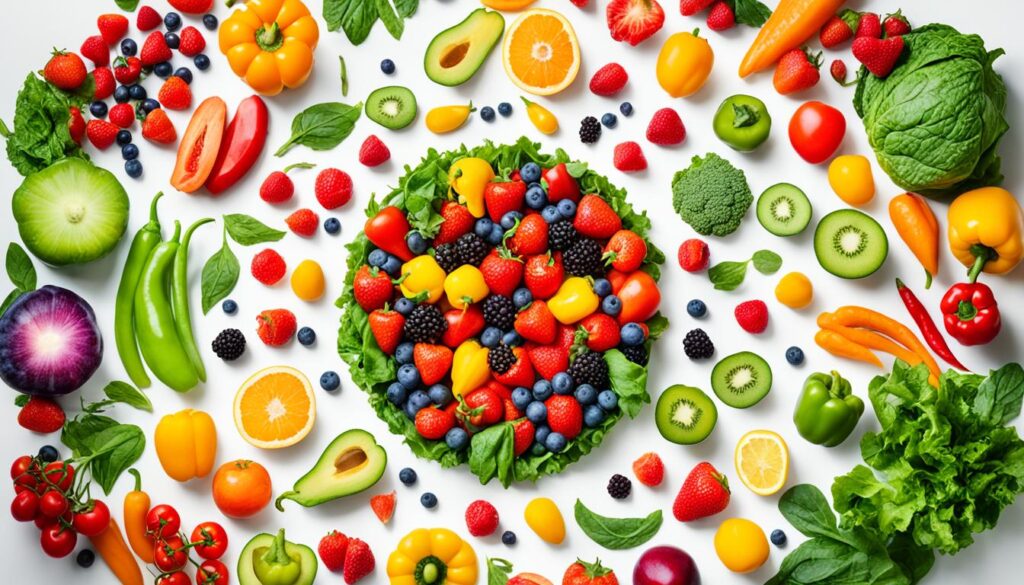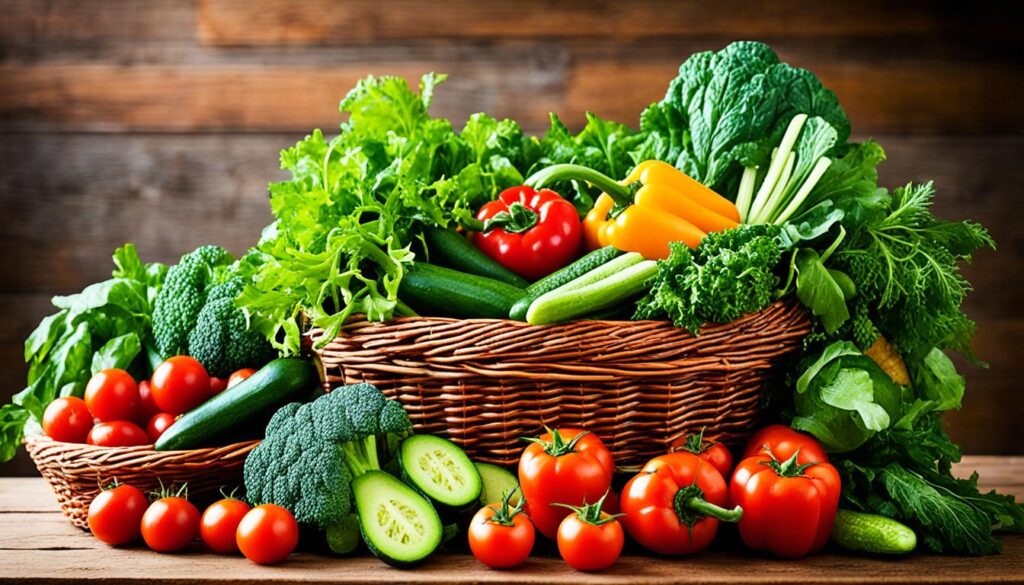Best Sources Of Vitamin C is a vital nutrient that supports various aspects of your health, from immune function to collagen synthesis. Including foods rich in vitamin C in your diet can provide significant benefits for your overall well-being. In this article, we will explore the best sources of vitamin C, their valuable health benefits, and how they can help you achieve optimal nutrition.
Key Takeaways:
- Include vitamin C-rich foods in your diet to maintain optimal health and well-being.
- Vitamin C is crucial for immune function, collagen synthesis, and wound healing.
- Citrus fruits, peppers, parsley, Kakadu plums, acerola cherries, rose hips, chili peppers, guavas, sweet yellow peppers, black currants, and parsley are excellent sources of vitamin C.
- Kakadu plums are the richest known source of vitamin C, while acerola cherries and rose hips offer significant amounts of this essential nutrient.
- Vitamin C-rich foods can provide antioxidant effects, support cardiovascular health, promote collagen synthesis, and enhance eye health.
The Importance of Vitamin C in Your Diet
Vitamin C is an essential nutrient that plays a vital role in several important processes in the body. From supporting immune function to collagen synthesis, this vitamin is crucial for maintaining optimal health and well-being.
One of the key functions of vitamin C is its role in boosting the immune system. It helps stimulate the production of white blood cells, which are responsible for fighting off infections and diseases. Without sufficient vitamin C, the immune system may become compromised, increasing the risk of illnesses and infections.
In addition to its immune-boosting properties, vitamin C is also essential for collagen synthesis. Collagen is a protein that provides structure and strength to the skin, bones, tendons, and other connective tissues. Vitamin C is necessary for the production of collagen, which helps maintain healthy skin, promotes wound healing, and supports overall tissue repair.
Furthermore, vitamin C is involved in the absorption of iron from plant-based food sources. Iron is essential for the formation of red blood cells and oxygen transportation throughout the body. By enhancing iron absorption, vitamin C helps prevent iron deficiency anemia and ensures the body receives an adequate supply of this vital nutrient.
“Vitamin C is crucial for immune function, collagen synthesis, and iron absorption. Without sufficient vitamin C, the immune system weakens, collagen production is impaired, and iron deficiency can occur.”
A deficiency in vitamin C can lead to various health problems. Scurvy is a severe vitamin C deficiency disease that causes symptoms such as fatigue, weakness, swollen and bleeding gums, joint pain, and poor wound healing. Chronic vitamin C deficiency can also impair collagen synthesis, leading to weakened connective tissues and increased susceptibility to bruising.
It’s important to include vitamin C-rich foods in your diet to prevent deficiency and maintain optimal health. In the next section, we will explore the top food sources of vitamin C and how they can enhance your well-being.
Top Food Sources of Vitamin C
Vitamin C is a vital nutrient that plays a crucial role in supporting our immune system and overall health. Including foods high in vitamin C in your diet is essential to meet your daily requirements and enhance your well-being. Here are some of the top food sources rich in this essential vitamin:
Citrus Fruits
Citrus fruits, such as oranges, grapefruits, and lemons, are well-known for their high vitamin C content. These tangy and refreshing fruits not only provide a burst of flavor but also deliver a significant amount of vitamin C. Including citrus fruits in your diet can help boost your immune system and support collagen synthesis for healthy skin.
Peppers
Peppers, particularly red and green bell peppers, are another excellent source of vitamin C. These colorful vegetables add a vibrant touch to your meals while providing a substantial dose of this essential nutrient. Whether you prefer sweet or spicy, peppers are a versatile ingredient that can be enjoyed raw, roasted, or sautéed to enhance the flavor and nutritional value of your dishes.
Fresh Parsley
Parsley is not just a garnish but also a rich source of vitamin C. This aromatic herb adds a fresh and flavorful element to a variety of dishes, including salads, soups, and sauces. Incorporating fresh parsley into your meals can not only enhance the taste but also boost your vitamin C intake for optimal health.
To further visualize the vitamin C content of these food sources, here is a table highlighting their approximate amounts per 100 grams:
| Food Source | Vitamin C Content (mg) |
|---|---|
| Oranges | 53.2 |
| Grapefruits | 31.2 |
| Lemons | 53 |
| Red Bell Peppers | 127.7 |
| Green Bell Peppers | 80.4 |
| Parsley | 133 |
As you can see, incorporating these vitamin C-rich foods into your diet can help you meet your daily requirements and support your overall health. Including a variety of fruits, vegetables, and herbs in your meals ensures a diverse range of nutrients to promote optimal nutrition and well-being.
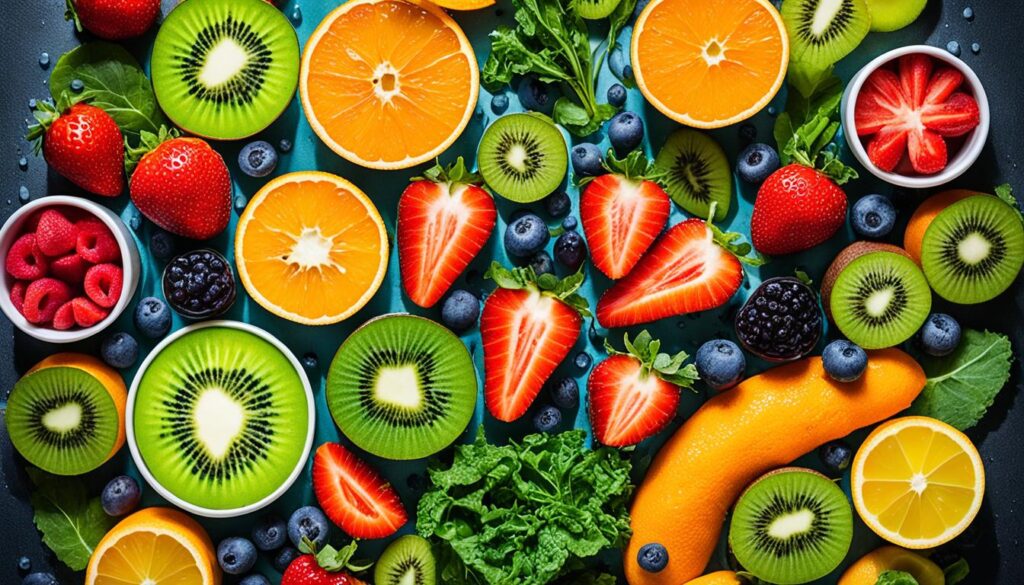
Kakadu Plums: The Richest Known Source of Vitamin C
Kakadu plums, a native superfood from Australia, pack an extraordinary amount of vitamin C. With an astounding 2,907 mg of vitamin C per 100 grams, Kakadu plums hold the title for being the richest known source of this essential nutrient. Not only do they provide an exceptional vitamin C content, but they also offer antioxidant properties that contribute to overall health.
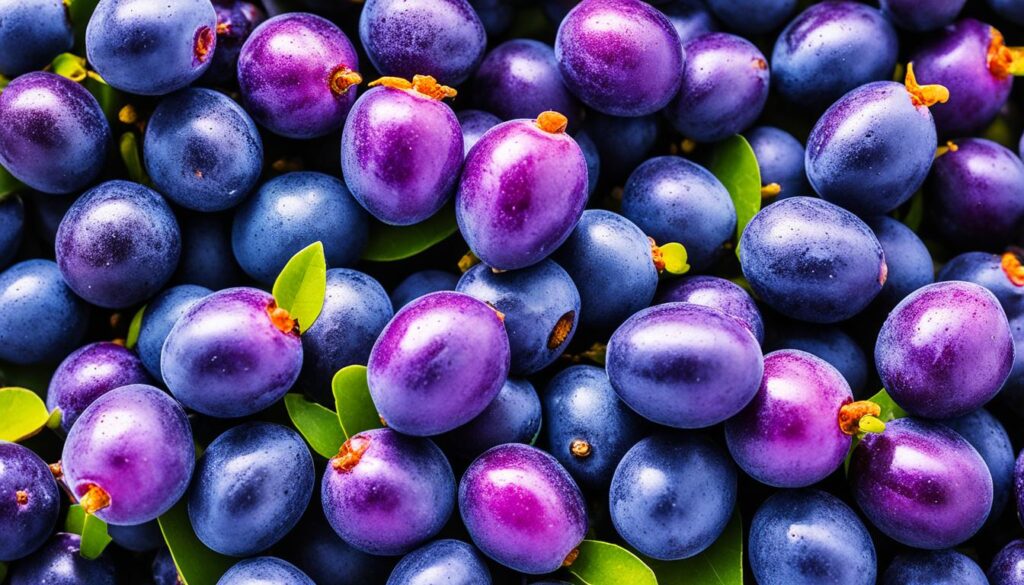
These nutrient-dense plums are not only high in vitamin C but also rich in other beneficial compounds. They contain potassium, a crucial mineral for maintaining proper bodily functions, as well as vitamin E, known for its antioxidant effects.
“Kakadu plums are the true powerhouse of vitamin C, surpassing other fruits and vegetables in their content. Incorporating these plums into your diet can have an array of positive effects on your health and well-being.” – Dr. Amanda Roberts, Nutrition Expert
The remarkable vitamin C content in Kakadu plums provides numerous health benefits. Vitamin C is an essential nutrient that supports immune function, helps with collagen synthesis, and acts as a potent antioxidant. By incorporating Kakadu plums into your diet, you can promote a healthy immune system, support skin health, and enhance your overall well-being.
Kakadu Plums vs. Other Vitamin C Sources
When it comes to vitamin C content, Kakadu plums outshine other fruits and vegetables. Let’s take a closer look at how they compare:
| Source | Vitamin C Content (per 100 grams) |
|---|---|
| Kakadu Plums | 2,907 mg |
| Oranges | 53.2 mg |
| Strawberries | 58.8 mg |
| Sweet Red Peppers | 127.7 mg |
As shown in the table above, Kakadu plums far surpass commonly consumed fruits and vegetables in their vitamin C content. Incorporating them into your diet can significantly boost your vitamin C intake and maximize the associated health benefits.
Acerola Cherries: A Vitamin C Powerhouse
Acerola cherries are a delicious and nutritious fruit that can provide a significant boost to your vitamin C intake. These cherries are known for their exceptional vitamin C content, making them an excellent addition to a healthy diet.
With an impressive 825 mg of vitamin C per 1/2 cup, acerola cherries deliver a whopping 916% of the daily value for this essential nutrient.
But the benefits of acerola cherries go beyond their vitamin C content. These cherries also possess antioxidant and anti-inflammatory properties, which can help protect your body against oxidative stress and inflammation.
Incorporating acerola cherries into your diet can provide numerous health benefits, including:
- Boosting your immune system
- Supporting collagen synthesis for healthy skin
- Enhancing antioxidant defenses
- Reducing inflammation
Whether enjoyed fresh, dried, or as a juice, acerola cherries are a versatile and delicious way to reap the benefits of their vitamin C content and other valuable nutrients.
Acerola cherries are a nutritional powerhouse, offering an abundance of vitamin C and other health-promoting properties. Including these cherries in your diet can contribute to optimal nutrition and overall well-being.
Vitamin C Content in Common Foods
| Food | Vitamin C Content (mg per 100g) |
|---|---|
| Acerola Cherries | 1700 |
| Guava | 228.3 |
| Kiwi | 92.7 |
| Oranges | 53.2 |
| Strawberries | 59 |
| Tomatoes | 13 |
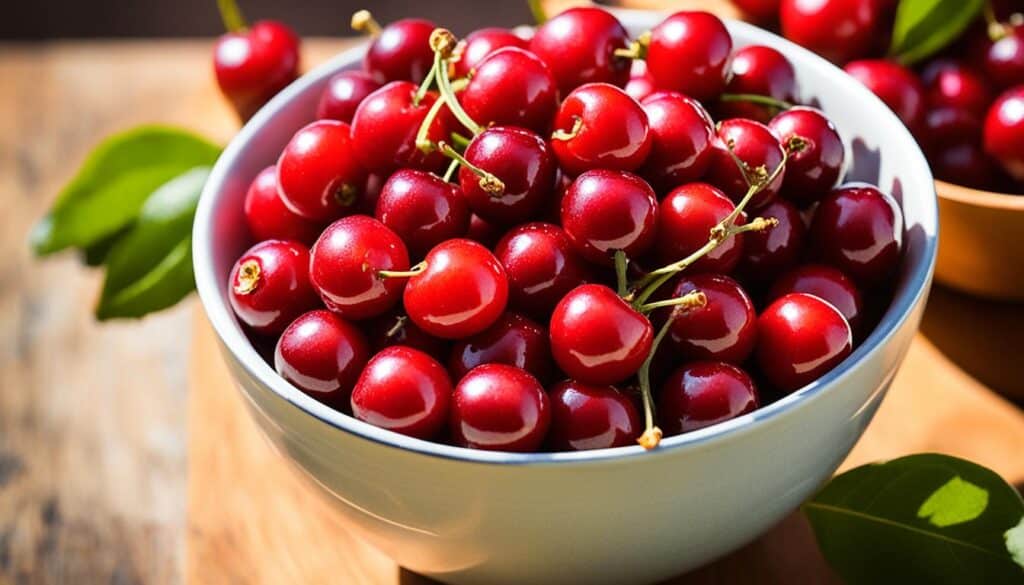
Rose Hips: A Tangy Source of Vitamin C
Rose hips are small, tangy fruits that pack a powerful punch of vitamin C. With a vitamin C content of 426 mg per 100 grams, rose hips provide an impressive 473% of the daily value for this essential nutrient.
Vitamin C is known for its role in supporting immune function and overall health. However, it also plays a vital role in collagen synthesis, which is crucial for skin health, elasticity, and integrity. Collagen is a protein that provides structure to the skin, helping to keep it firm, smooth, and youthful-looking.
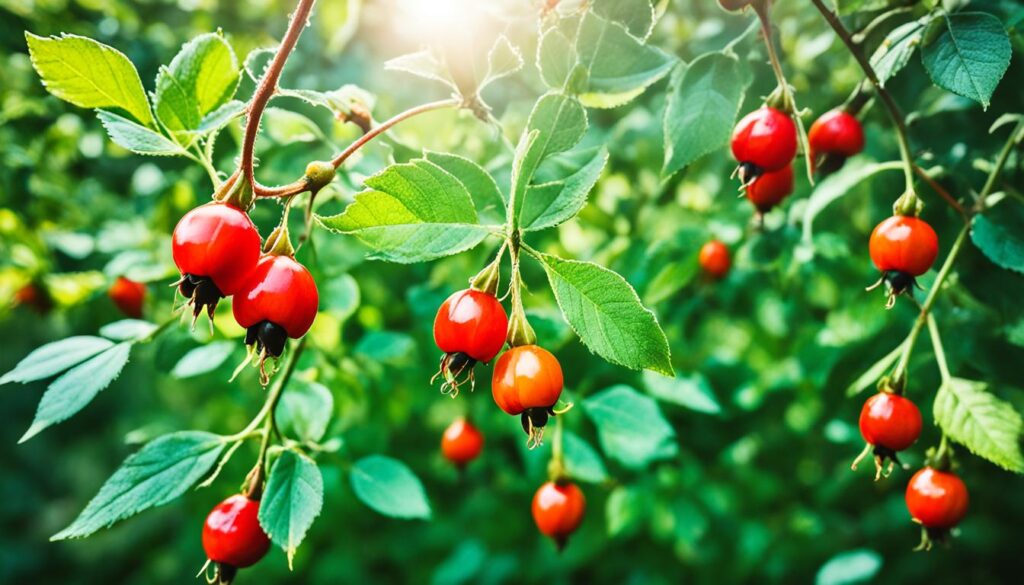
By incorporating rose hips into your diet, you can promote collagen synthesis and support healthier-looking skin. These tangy fruits can be enjoyed in various forms, such as herbal teas, fruit preserves, or even added to baked goods.
| Vitamin C Content | Daily Value |
|---|---|
| 426 mg per 100 grams | 473% |
In addition to their vitamin C content, rose hips contain other beneficial nutrients such as antioxidants and vitamins A, E, and K. Antioxidants help protect the body against free radicals, which can contribute to cellular damage and aging. Vitamin A supports healthy vision, while vitamins E and K have various roles in maintaining overall health.
Rose hips are not only a tangy addition to your diet but also a natural way to boost your vitamin C intake and support skin health. Try incorporating rose hip-infused products or enjoy them fresh for a delicious and nutritious way to enhance your skin’s appearance.
Remember, maintaining optimal skin health goes beyond external care. Nourishing your body from within with vitamin C-rich foods like rose hips can contribute to a radiant and youthful complexion.
Chili Peppers: A Spicy Boost of Vitamin C
Chili peppers not only add a spicy kick to your meals but also offer a healthy dose of vitamin C. Green chili peppers contain 109 mg of vitamin C per pepper, while red chili peppers deliver 65 mg. Including these fiery peppers in your diet can help you meet your daily vitamin C requirements and support your overall health.
“Spice up your meals with chili peppers to add flavor and a boost of vitamin C to your diet.”
In addition to their vitamin C content, chili peppers have been associated with beneficial effects on cardiovascular health. According to a study published in the Journal of the American College of Cardiology, the capsaicin in chili peppers can help reduce the risk of developing cardiovascular disease. Capsaicin has been shown to promote healthy blood circulation, improve blood vessel function, and lower blood pressure. These effects contribute to a healthier cardiovascular system and a potential decrease in mortality rates.
So, the next time you’re looking to add a little spice to your meals, consider reaching for chili peppers. Not only will they add flavor and heat, but they’ll also provide a spicy boost of vitamin C and potential cardiovascular health benefits.
| Chili Pepper Type | Vitamin C Content (per pepper) |
|---|---|
| Green Chili Pepper | 109 mg |
| Red Chili Pepper | 65 mg |
Guavas: A Tropical Vitamin C Powerhouse
Guavas are tropical fruits that pack a powerful punch of vitamin C. With one guava providing 125 mg of vitamin C, which is 138% of the daily value, incorporating guavas into your diet can be a delicious and nutritious way to boost your vitamin C intake. But the benefits of guavas go beyond just their vitamin content.
Research has shown that consuming guavas can have a positive impact on cardiovascular health. Studies have found that regular consumption of guavas can significantly lower blood pressure and total cholesterol levels, both of which are important factors for maintaining cardiovascular health.
One study published in the American Journal of Cardiology found that participants who consumed guava regularly experienced a significant reduction in systolic and diastolic blood pressure compared to those who did not consume guava.
“Guavas are not only delicious but also have impressive cardiovascular benefits. The rich vitamin C content in guavas, along with other bioactive compounds, helps lower blood pressure and improve overall heart health.”
The cardiovascular benefits of guavas can be attributed to their high levels of antioxidants, including vitamin C. These antioxidants help reduce inflammation, improve blood vessel function, and protect against oxidative stress, all of which contribute to better cardiovascular health.
By adding guavas to your diet, you not only increase your vitamin C intake but also support your heart health. Whether enjoyed as a snack, added to smoothies, or incorporated into recipes, guavas offer a delicious way to reap the benefits of this tropical vitamin C powerhouse.
Comparison of Vitamin C Content in Fruits
| Fruit | Vitamin C Content (mg per 100g) |
|---|---|
| Guava | 125 |
| Kakadu Plum | 2,907 |
| Acerola Cherries | 1,678 |
| Orange | 53 |
| Strawberries | 59 |
As shown in the table above, guavas are a standout fruit when it comes to vitamin C content. Their high concentration of this essential vitamin makes them an excellent choice for supporting your overall health and well-being.
Sweet Yellow Peppers: A Colorful Source of Vitamin C
Sweet yellow peppers are not only visually appealing but also rich in vitamin C, making them a valuable addition to your diet. These vibrant peppers, especially when fully mature, boast an impressive vitamin C content that can benefit your overall health. Just one large yellow pepper provides a whopping 342 mg of vitamin C, which is approximately 380% of the recommended daily value.
Vitamin C plays a crucial role in maintaining eye health, and consuming enough of this essential nutrient is particularly important for protecting against cataract progression. Incorporating sweet yellow peppers into your meals can enhance your vitamin C intake and support optimal eye health.

Not only do sweet yellow peppers provide an abundance of vitamin C, but they also offer other valuable nutrients, such as vitamin A and potassium. Vitamin A is essential for maintaining good vision, while potassium helps regulate blood pressure and supports cardiovascular health.
To capitalize on the benefits of sweet yellow peppers, try incorporating them into various dishes. They can be a flavorful addition to salads, stir-fries, pasta dishes, or even roasted as a delicious side dish. Their natural sweetness and vibrant color can elevate the visual appeal and nutritional value of your meals.
Health Benefits of Sweet Yellow Peppers:
- Rich in vitamin C, providing 342 mg per large pepper
- Supports eye health and helps prevent cataract progression
- Contains vitamin A for good vision
- Contributes to a healthy cardiovascular system with potassium
By incorporating sweet yellow peppers into your diet, you can enjoy their enticing flavor while reaping the many health benefits. Discover creative ways to include these colorful peppers in your meals and enhance your vitamin C intake for optimal eye health.
Vitamin C Content in Other Common Foods
| Food | Vitamin C Content (mg per 100g) |
|---|---|
| Orange | 53.2 mg |
| Strawberries | 58.8 mg |
| Kiwi | 92.7 mg |
| Mango | 36.4 mg |
Black Currants: Small Berries Packed with Vitamin C
Black currants are small berries that offer a significant amount of vitamin C. With 102 mg per half cup, black currants provide 113% of the daily value for vitamin C. These berries are also rich in antioxidants, which have been associated with reducing oxidative damage linked to chronic diseases such as heart disease, cancer, and neurodegenerative conditions.
Benefits of Black Currants
Black currants are not only delicious but also packed with nutrients that can support your overall health. Here are some key benefits of including black currants in your diet:
- High Vitamin C Content: Black currants are one of the best sources of vitamin C, which plays a vital role in supporting immune function and collagen synthesis.
- Antioxidant Effects: The antioxidants present in black currants can help protect your cells from oxidative stress and reduce the risk of chronic diseases.
- Heart Health: Black currants contain heart-friendly nutrients like anthocyanins and polyphenols, which have been linked to a lower risk of heart disease.
- Brain Health: The antioxidants in black currants may help protect the brain from damage caused by oxidative stress, potentially reducing the risk of neurodegenerative conditions.
Incorporating black currants into your diet is a delicious way to boost your vitamin C intake and reap the benefits of their antioxidant effects.
Table: Comparison of Vitamin C Content in Various Fruits
| Fruit | Vitamin C Content per 100g |
|---|---|
| Black Currants | 181 mg |
| Oranges | 53.2 mg |
| Strawberries | 58.8 mg |
| Kiwi | 92.7 mg |
Parsley: More Than Just a Garnish
While parsley is commonly used as a garnish, it is also a noteworthy source of vitamin C. Just 2 tablespoons of fresh parsley contain 10 mg of vitamin C, providing 11% of the recommended daily value.
Parsley is not only rich in vitamin C but also in vitamin K, a nutrient essential for blood clotting and bone health. By incorporating parsley into your meals, you can increase your intake of these important vitamins and support overall well-being.
Moreover, parsley offers additional health benefits beyond its vitamin content. Studies suggest that parsley can play a role in increasing iron absorption, aiding in the prevention of iron deficiency anemia.
Furthermore, research indicates that parsley may potentially suppress advanced-stage tumor growth. This is due to its high antioxidant content, which helps neutralize harmful free radicals and protect against cellular damage.
Vitamin C supplements, Concentration of vitamin C, Foods that are high in vitamin C, Need for vitamin C, Found that vitamin C, Suggests that vitamin C, Levels of vitamin C, Vitamin C from food, Vitamin C per day, Whether vitamin C, DV for vitamin C, Vitamin C deficiency is rare, Vitamin C content of food, Vitamin C and other antioxidants, 500 mg vitamin C, Vegetables are the best sources of vitamin C, C per day than nonsmokers, Dietary vitamin C intake, Plant foods, Absorption of vitamin C, Little or no vitamin C, Vitamin C or other antioxidant, C or other antioxidant supplements, High intakes of vitamin C, Clear whether vitamin C, Vitamin C is a water-soluble, C is a water-soluble vitamin, Vitamin C plays an important role, C plays an important role, Suggests that vitamin C may, Adequate source of vitamin C, Believe that vitamin C, Vitamin C is also involved, Content of vitamin C, Low levels of vitamin C, C content of food may, Vitamin C has been added, Need 35 mg more vitamin, 35 mg more vitamin C per, Adequate amounts of vitamin C, Little vitamin C and heat, C and heat can destroy, Antioxidant content of these foods, Doses of vitamin C could, Fortified foods and dietary supplements, Recommended dietary allowance of vitamin, Dietary allowance of vitamin C, Vitamin C and healthful, High-dose intravenous vitamin C, Using vitamin C supplements, Vitamin C improves the absorption, Lack of vitamin C, 70 milligrams of vitamin C, C from fruits and vegetables, Find out if vitamin C, Daily upper limits for vitamin, Upper limits for vitamin C, Taking high doses of vitamin, Low vitamin C intake, Vitamin C is an important, Great source of vitamin C, Heat can destroy vitamin C, Fortified with vitamin C.
Whether you sprinkle it on top of dishes or add it to your smoothies, parsley is more than just a garnish – it’s a nutrient-packed herb that can contribute to your overall health and well-being.
Also Read:- 9 Foods High In Zinc
Conclusion
Incorporating the best sources of vitamin C into your diet is crucial for maintaining optimal health and well-being. Foods such as Kakadu plums, acerola cherries, rose hips, and chili peppers offer significant amounts of vitamin C and provide numerous health benefits. By including these fruits, vegetables, and herbs in your meals, you can ensure an adequate intake of vitamin C and support your overall wellness.
Vitamin C plays a vital role in immune function, collagen synthesis, wound healing, and cardiovascular health. It is essential for preventing deficiency symptoms such as bleeding gums and poor wound healing. Adding vitamin C-rich foods to your daily diet can help prevent deficiencies and promote optimal functioning of these essential processes in your body.
Moreover, vitamin C offers antioxidant properties, which can help protect your cells against oxidative damage. Adequate vitamin C intake has been associated with reduced risk of chronic diseases and may contribute to the maintenance of good eye health and skin integrity. Including the best sources of vitamin C in your diet can support your overall well-being and contribute to optimal nutrition.
When considering changes to your diet, it is always advisable to consult with a healthcare professional to receive personalized dietary recommendations. They can provide guidance on the correct amount of vitamin C intake based on your specific needs, ensuring you reach the optimal level for your health and wellness.
FAQs
Q: How much vitamin C should I consume daily?
A: The recommended daily intake of vitamin C for adults is around 75-90 mg for women and 90 mg for men.
Q: What are the natural sources of vitamin C?
A: Some natural sources of vitamin C include citrus fruits, strawberries, bell peppers, broccoli, and kiwi.
Q: What are the effects of vitamin C deficiency?
A: Vitamin C deficiency can lead to scurvy, fatigue, weakened immune system, and slower wound healing.
Q: Are there foods that are particularly high in vitamin C?
A: Yes, foods such as peppers, guava, kiwi, and citrus fruits are particularly high in vitamin C.
Q: What is the role of vitamin C in maintaining health?
A: Vitamin C plays a crucial role in boosting the immune system, collagen production, and acts as an antioxidant in the body.
Q: Can high doses of vitamin C be harmful?
A: Consuming very high doses of vitamin C through supplements can lead to stomach cramps, diarrhea, and kidney stones in some individuals.
Q: How can I prevent vitamin C deficiency?
A: To prevent vitamin C deficiency, ensure you have a balanced diet rich in fruits and vegetables, which are the best sources of this essential vitamin.
